There were thousands of Sumerian gods worshipped in the cradle of civilization, from the powerful Lord of the Heavens, An, to the terrifying goddess Ereshkigal, who ruled over the Netherworld.
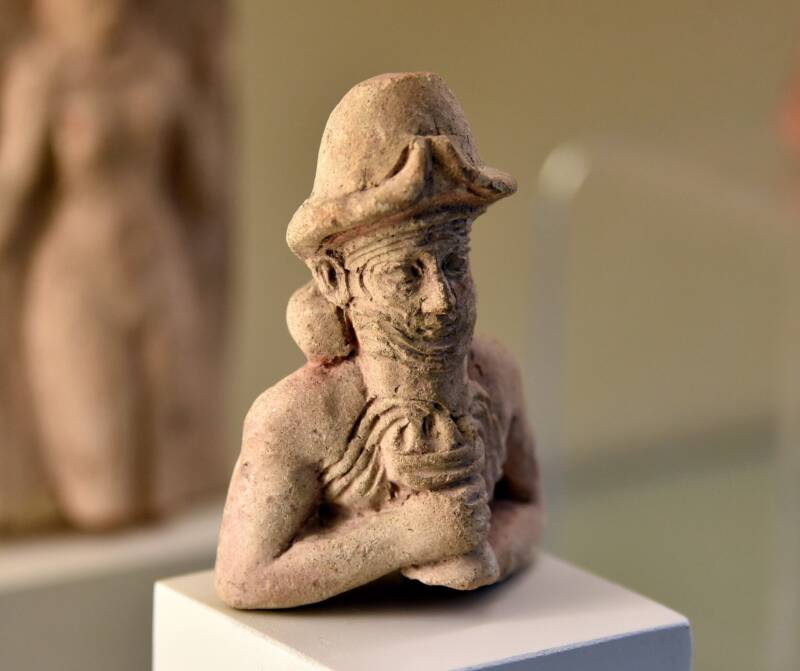
Osama Shukir Muhammed Amin FRCP(Glasg)/Wikimedia CommonsA depiction of a Sumerian god, possibly Enki.
Sumer is one of history’s oldest civilizations. Long before the Egyptians built the pyramids, the Sumerians flourished in Mesopotamia. Between 4,500 and 1,900 B.C.E.. they invented one of the earliest forms of writing, created the plow, and developed an advanced numerical system. Religion was also important, and people worshipped a number of Sumerian gods.
The Sumerians worshipped thousands of gods — perhaps as many as 3,000 — from An, the Lord of the Sky, to Ereshkigal, the goddess in charge of the Netherworld. But while Sumerian gods were powerful, they were also shockingly human. They needed food and water, and they were fallible.
But unlike humans, the gods of Sumer were immortal – and they weren’t always benevolent.
Religion In Ancient Sumer
Religion played an important role in ancient Sumer, a technologically advanced civilization that thrived in Mesopotamia between roughly 4,500 and 1,900 B.C.E. There were thousands of Sumerian gods, and cities in Sumer normally had a “patron” god who they worshipped.
While modern religions often have gods that are omniscient or all-powerful, Sumerian gods were surprisingly human. They required food and water, made mistakes that became Sumerian parables, and could be mercurial toward their human subjects. For example in The Epic of Gilgamesh, thought to be the oldest story in human history, Gilgamesh rejects the advances of the goddess Inanna. The goddess is so enraged that she dispatches the Bull of Heaven to ravish the earth — killing Gilgamesh’s best friend Enkidu.
Sumerian myth also states that the god Enlil once conjured a flood to destroy mankind because loud humans were keeping him from sleeping.
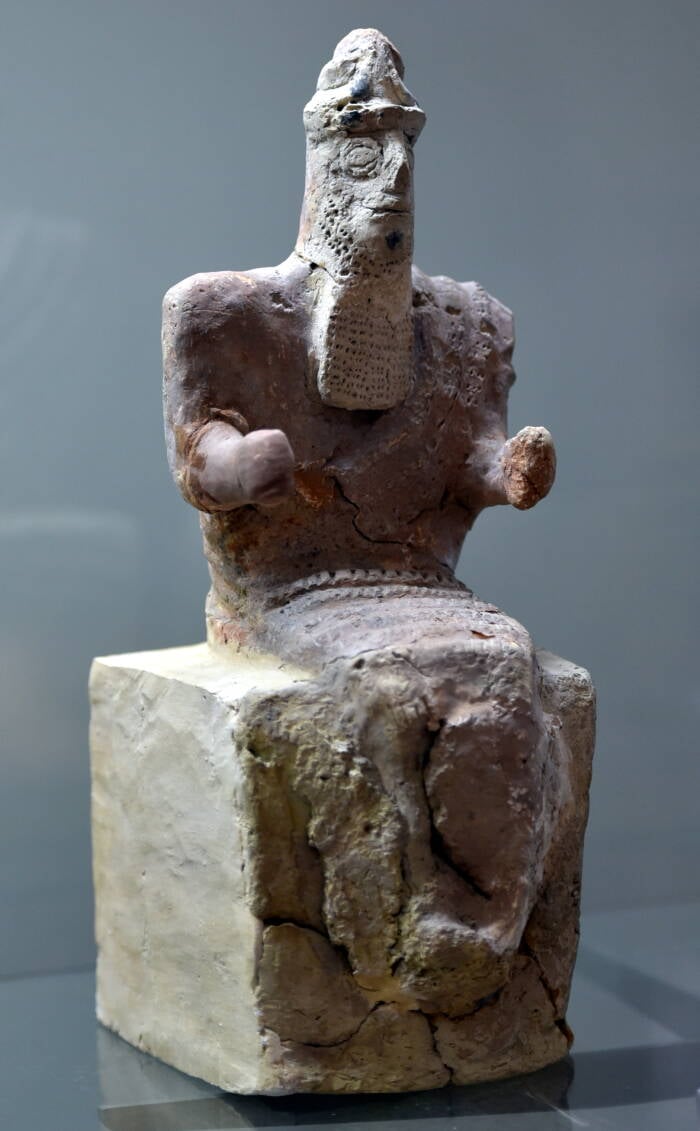
Osama Shukir Muhammed Amin FRCP(Glasg)/Wikimedia CommonsA statuette of Enlil from the Iraq Museum in Baghdad, Iraq.
In this myth — which bears a strong resemblance to other flood myths like the story of Noah’s Ark — another god warns a human named Atra-hasis to build an ark to save himself, his family, and his animals.
But while Sumerian gods were fallible, they were also powerful. They were thought to be giant and fearsome, and to have a special glow called melammu which distinguished them from humans.
Sumerian gods were also thought to be largely related to each other, and most descended from the mother goddess, Nammu.
Some Of The Most Important Sumerian Gods
Sumerian mythology states that Nammu, a mother goddess linked to the primeval sea, gave birth to two of the most important Sumerian gods: An, the god of the skies, and Ki, the goddess of the earth.
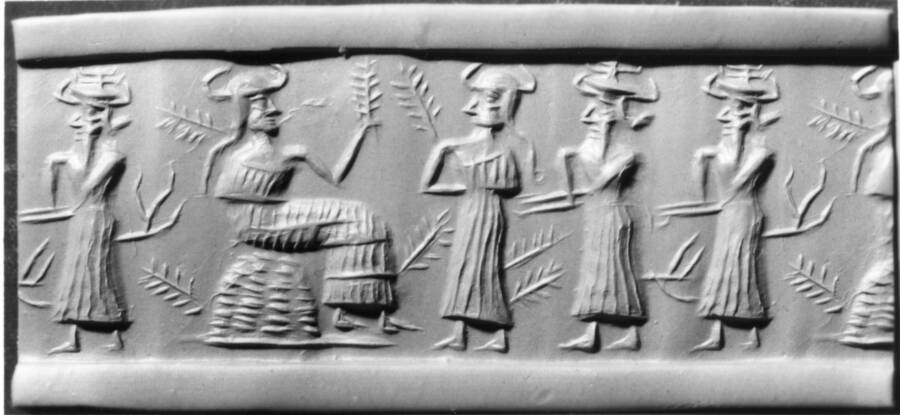
Public DomainA seal from between 2350 and 2150 B.C.E. which appears to depict Ki, also known as Ninhursag.
An, one of the most powerful Sumerian gods, was the patron god of the city Uruk and Lord of the Heavens. He’s associated with thunder, and often envisioned as a bull crashing through the clouds. Ki was a goddess of fertility, nature, and life on earth, tasked with caring for women and children. She and An had several children together, who are gods known as the Anunnaki.
One of their children was Enlil, who separated the sky from the earth to create a world for human beings. Enlil was said to be the god of air, rain, and storms, and he could bestow power to kings. But Enlil was also sometimes described as being aggressive. Indeed, he conjured the flood meant to destroy all of mankind because humans were too loud.
He was thwarted by Enki, a benevolent Sumerian god who was connected to water and wisdom. Sumerian myth states that he helped create humankind by working with Nammu to create a clay figurine, who was given life. Enki was also said to be a friend to humans, and Sumerian myth states that he filled the Tigris and Euphrates rivers with water and life.
Additionally, the Sumerians worshiped Inanna, the beloved goddess of love, sex, fertility, passion, and war. They also revered Utu, the god of sun and divine justice, as well as Nanna, the god of the moon and wisdom.
And most people in ancient Sumer would probably have feared Ereshkigal, the terrifying goddess of the Netherworld. The sister of Inanna, Ereshkigal was married to Nergal, the god of war, death, and disease.
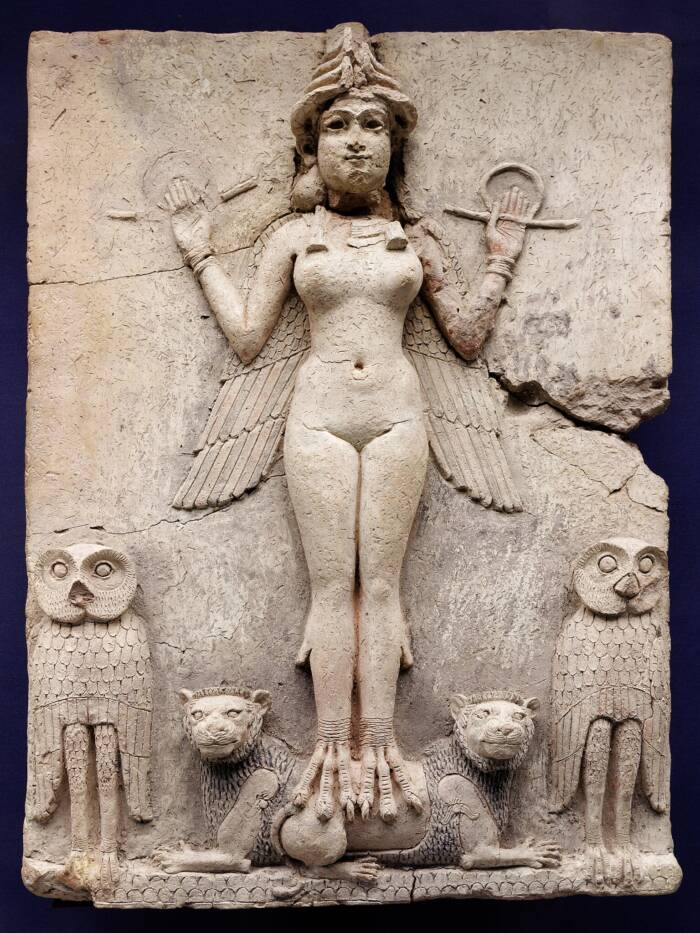
Gennadii Saus i Segura/Wikimedia CommonsA stone relief which may depict Ereshkigal.
Cities across Sumer built massive temples to worship the Sumerian gods. Priests made offerings, worshippers offered food, and festivals were held to honor the gods. People would often pray to lesser gods, in hopes that their prayers would make their way up to more powerful deities like Enlil and An.
Clearly, these gods played an important role in Sumerian life. But in modern times, a strange theory has emerged that suggests that Sumerian gods were not of this world.
Were These Ancient Deities Aliens?
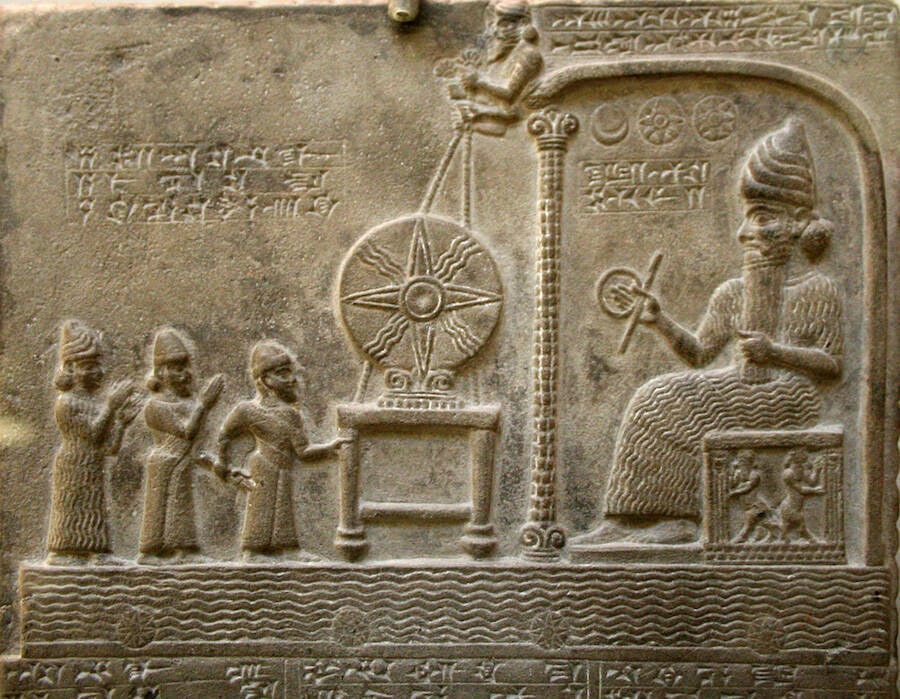
Wikimedia CommonsA carving of the Anunnaki, which one modern day theory suggests were actually ancient aliens who bestowed knowledge on the Sumerians.
Today, ancient Sumer is remembered as the “cradle of civilization” and its people are credited with developing or perfecting some of the most important inventions in human history. They came up with one of the first known methods of writing, developed irrigation techniques, created the plow, devised numerical systems, and were able to mass produce items like pottery and bricks. How did the Sumerians accomplish this?
According to one modern-day theory, the Sumerians had help from outer space. It states that the powerful Sumerian gods known as the Anunnaki were actually aliens from a planet called Nibiru. They purportedly helped the Sumerians develop their advanced civilization because they wanted humans to harvest gold, which the aliens needed to repair their planet.
This theory was first put forward in 1976 by a scholar named Zecharia Sitchin, who spent his life studying Hebrew, Akkadian, and Sumerian.
“This is in the texts; I’m not making it up,” Sitchin told The New York Times in 2010. “[The aliens] wanted to create primitive workers from the homo erectus and give him the genes to allow him to think and use tools.”
That said, few people have accepted Sitchin’s theory.
Whether or not Sitchin was right — and there is little evidence to support his notion — it’s clear that Sumerian gods played a crucial role in Sumerian society. They provided reason and purpose, and gave birth to some of the most famous stories and myths in human history. Though many details about them are lost today, Sumerian gods undoubtedly changed human civilization, just as the innovative Sumerians did themselves.
After reading about the most powerful Sumerian gods, discover the myths behind some of the most fascinating gods in the Greek pantheon. Or, learn more about the gods from Norse mythology.





